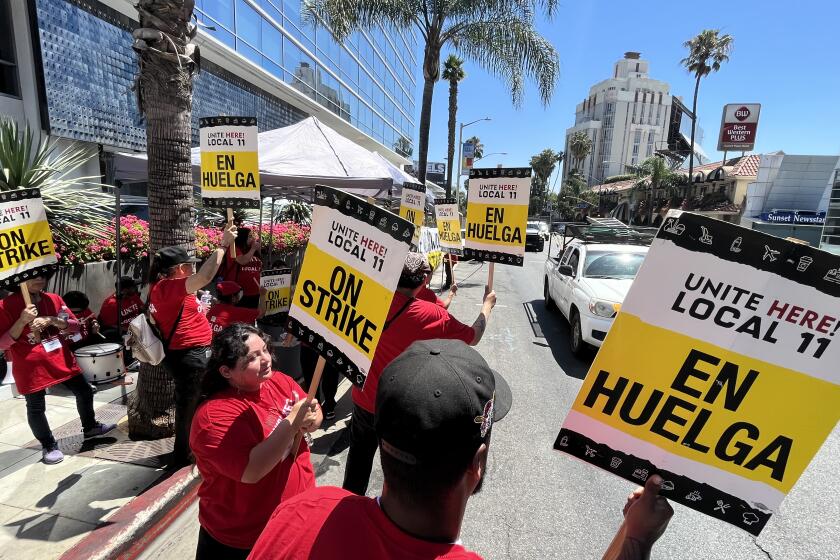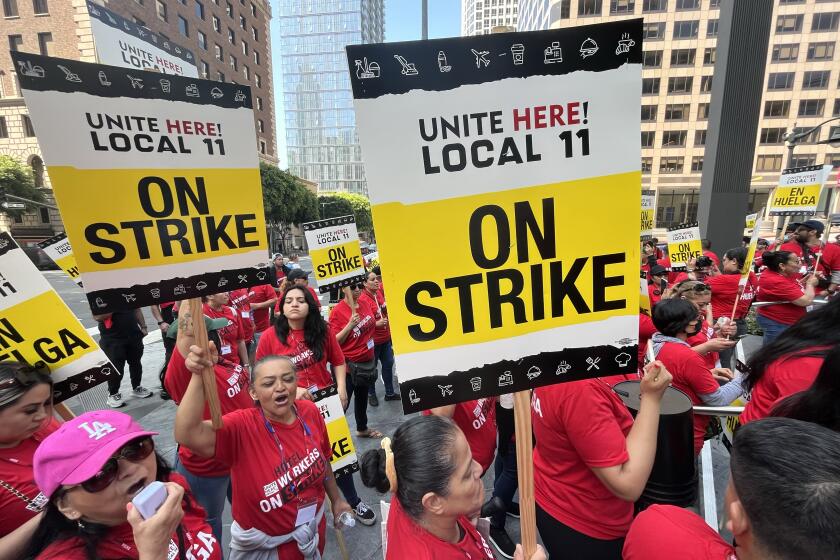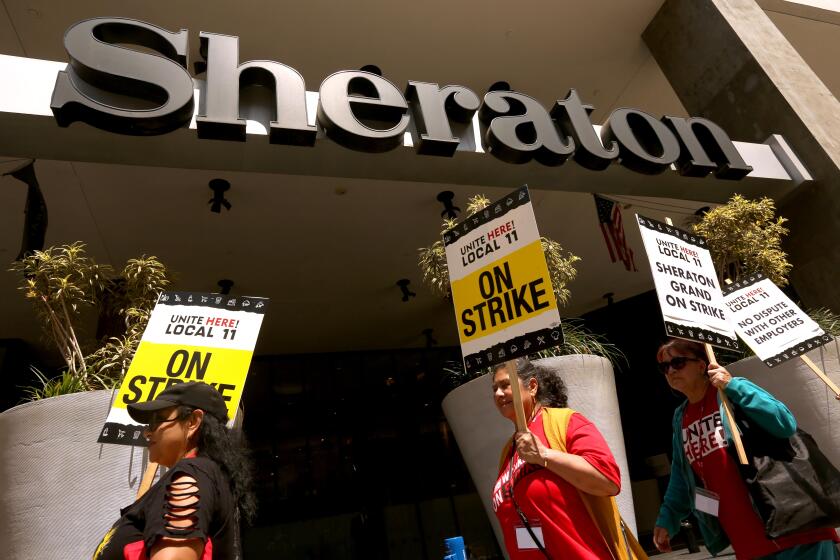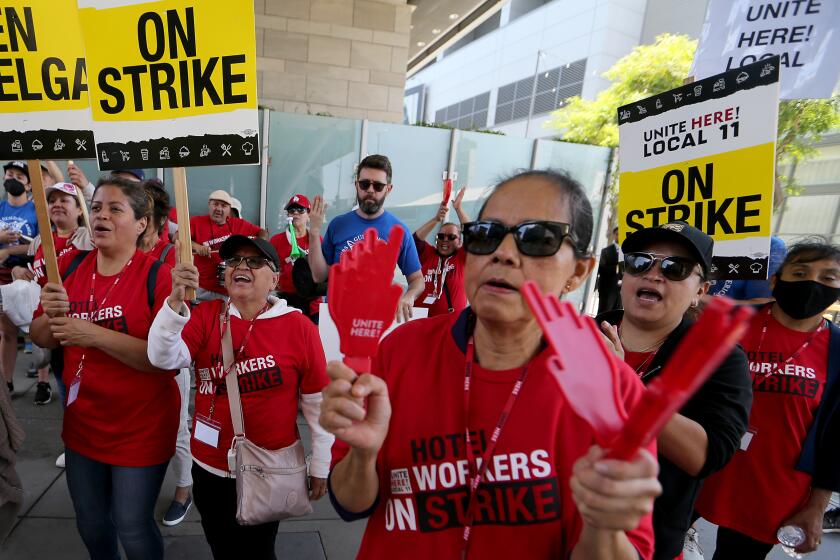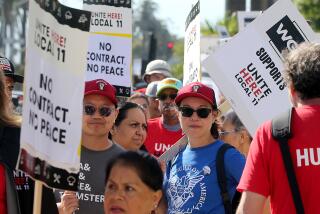Southern California’s hotel worker strike rolls to new spots. Here’s what’s at stake
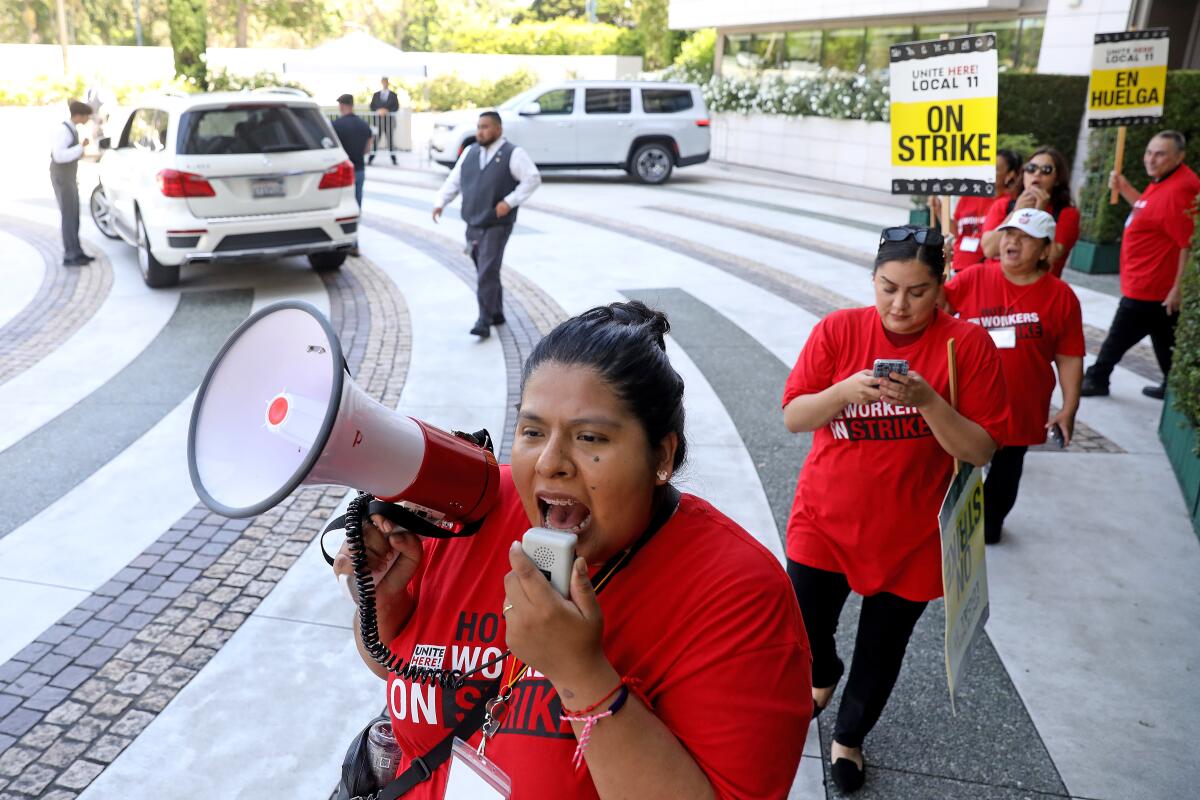
An ongoing strike by Southern California hotel workers enveloped the Beverly Hilton, longtime host of the annual Golden Globe Awards, and the upscale Waldorf Astoria in Beverly Hills early Monday morning.
It marks the latest escalation of a heated labor dispute between thousands of cooks, housekeepers, dishwashers, servers, bellmen, and front desk agents represented by Unite Here Local 11 and some 60 hotels in Los Angeles and Orange counties.
Workers at the Fairmont Century Plaza Hotel, Hyatt Regency LAX, and Laguna Cliffs Marriott Hotel Resort & Spa in Dana Point also went on strike Monday, extending the footprint of the “third wave” of work stoppages that began July 20.
Hotel workers have been walking off the job in intermittent few-day spurts ever since the long Fourth of July holiday weekend. That weekend protest came as contracts covering some 15,000 local hotel workers expired.
Workers at 43 hotels have participated in the strike so far, the union said.
After tense bargaining talks Tuesday, hotel workers in Hollywood and Pasadena walked off the job Thursday in a third wave of strikes to hit Southern California’s hospitality sector this summer.
It’s been a hectic few weeks in the Los Angeles tourism industry and with constantly shifting strike action it can be hard to keep track of what’s going on. Here’s what you need to know now.
What do the hotel workers want?
The picketing hotel workers have said their pay hasn’t kept pace with soaring housing costs, and as a result, many have been displaced from neighborhoods near their workplaces and forced into long commutes.
To remedy that, they are asking for higher wages and better benefits and working conditions. A $5 immediate hourly wage increase, and a $3 boost each subsequent year of the three-year contract, for a total raise of $11, is Unite Here Local 11’s key demand.
The union also has made proposals related to healthcare, pensions, workload and a policy against hotels using E-Verify, a federal system used to check work eligibility, to protect immigrant workers.
Thousands of workers at hotels in Los Angeles and Orange counties walked off the job, the latest in a series of labor actions as California workers push for better pay and working conditions.
What is the position of the hotels?
Hotel operators have said Unite Here Local 11’s demands are unreasonable and an overreach.
The loudest voice representing the hotels’ position in the dispute is a newly formed Coordinated Bargaining Group that represents 44 hotels in Southern California.
The group formed after Unite Here Local 11 on April 20 presented sweeping proposals on issues including wages and housing initiatives aiding tourism workers.
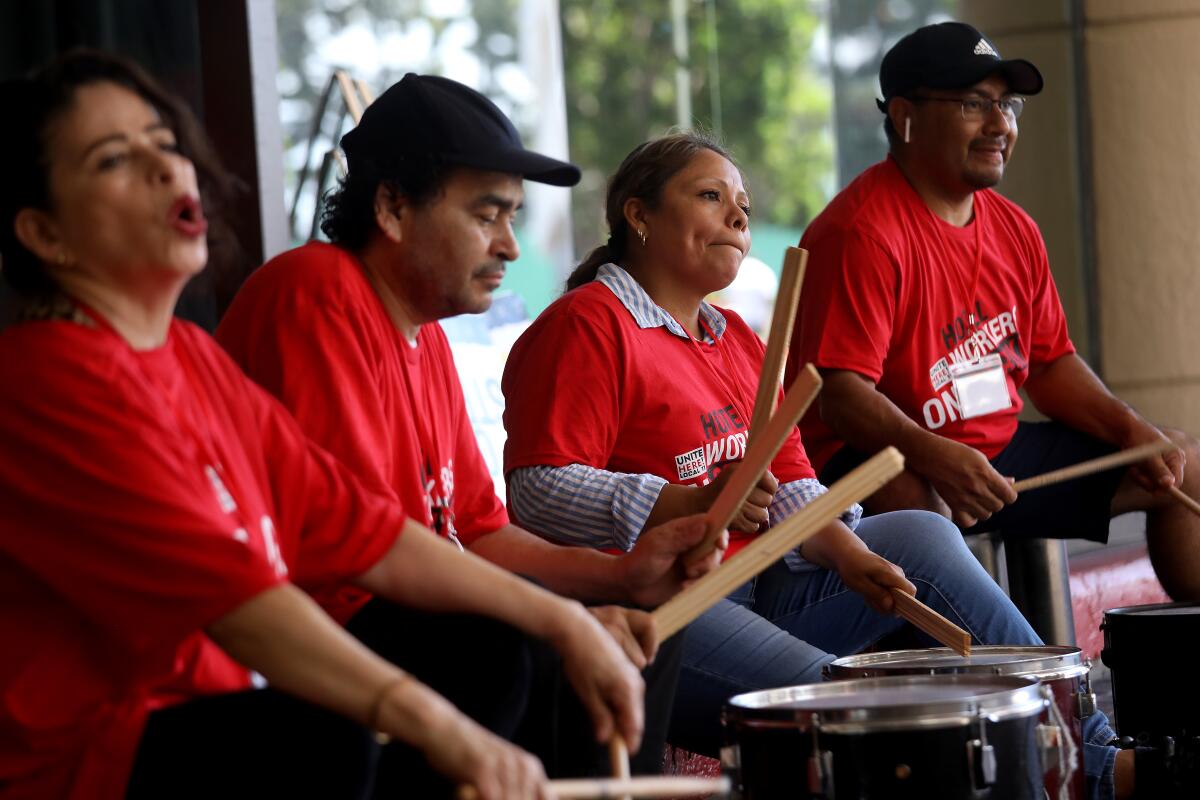
The group has accused the union of striking over policy proposals that have “nothing to do” with the employees it represents, filing an unfair labor practice charge with the National Labor Relations Board.
In the unfair labor practice charge, the group takes issue with the union proposal for hotels to publicly endorse a measure set for the 2024 ballot that would require them to rent vacant rooms in Los Angeles to unhoused people. The union also has urged hotels to agree to impose a 7% fee on all guest room sales to create a fund that would assist hospitality workers in obtaining affordable housing.
The walkout by Local 11 of Unite Here is affecting about 20 hotels. Although they are staying open, their guests can expect the hotels to be noisier and possibly trim the amenities.
How far apart are the two sides?
The sides appear diametrically opposed and bargaining sessions — when they take place — are tense.
The union has been resolute in its demand that hotels agree to sweeping wage increases given how deeply the housing crisis affects workers. The hotel coalition has indicated that the union’s ask is too big.
After two waves of strikes, hotel operators and hotel workers returned to the bargaining table July 18. During those talks, the union rejected a new pay proposal by a group of Southern California hotel owners and operators. A third wave of strikes kicked off two days later.
Keith Grossman, an attorney representing the group, said in an email that the additional work stoppages announced Monday represented “Local 11’s continued counterproductive conduct.”
Union officials were similarly disgruntled. “A room attendant at the Waldorf Astoria must work 60 hours to earn enough to pay for one night at this ritzy hotel,” Petersen said in an emailed statement Monday. “Yet the hotel’s last offer did not add one more penny for wages.”
Ada Briceño, Susan Minato and Kurt Petersen are co-presidents of Unite Here Local 11. It’s believed to be the only such power-sharing arrangement in U.S. labor history.
The hotel group first proposed an initial raise of $1.75 per hour, with $0.75 bumps every six months through January 2027, amounting to a $6.25 per hour raise in total, according to documents obtained by the Times.
The hotel group had said housekeepers at unionized hotels in Beverly Hills and downtown Los Angeles currently earn $25 per hour and with the proposed pay would receive 10% wage increases in 2024 and make more than $31 per hour by January 2027.
In its most recent proposal — which the union rejected — the hotel group offered a bigger initial hourly pay raise of $2 that would go into effect sooner, following ratification of a new contract, instead of in January 2024. It offered fewer subsequent raises, however, amounting to a $5.50 per hour total increase by January 2027.
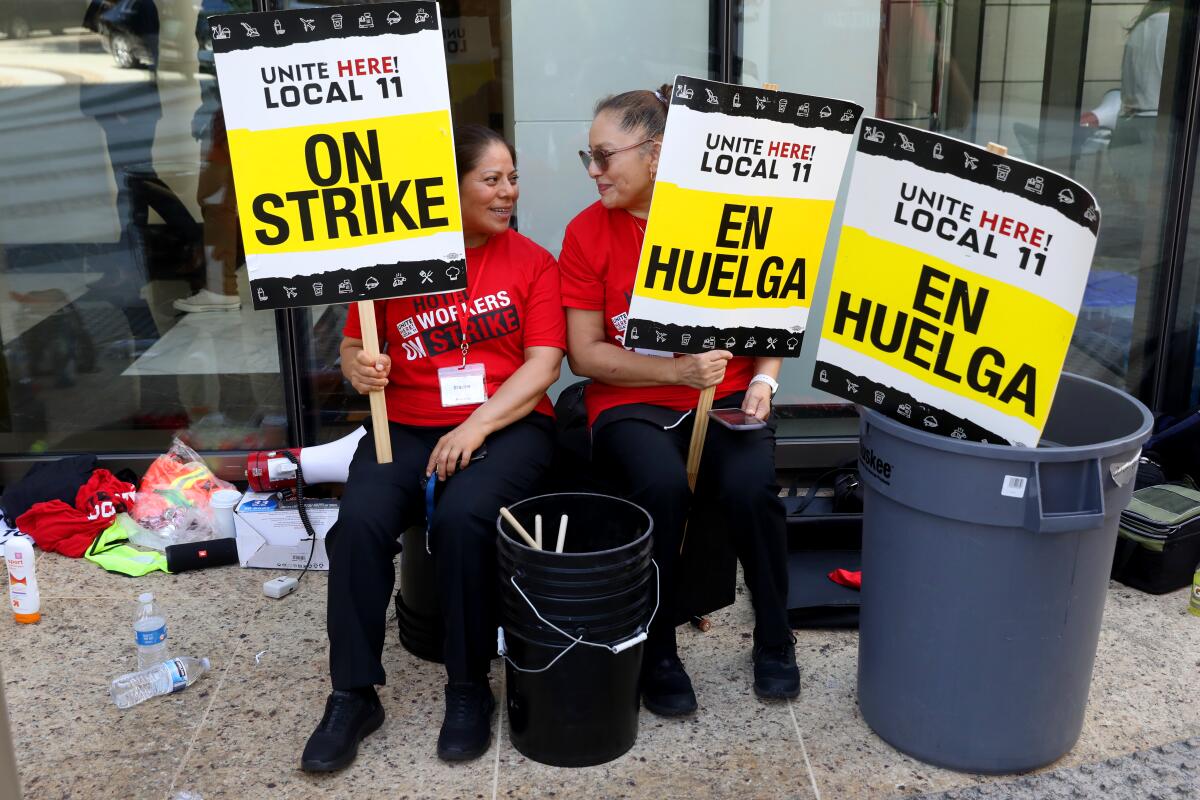
The Westin Bonaventure is the only hotel site so far to have reached a deal, averting a strike just as contracts were set to expire June 30.
The union has said the Westin Bonaventure deal fulfills most of the union’s demands, though it has declined to reveal specifics on wage increases.
Under the tentative deal with Westin Bonaventure, workers will receive higher wages, affordable health insurance at less than $20 per month and increases in pension contributions, the union said.
The agreement also guarantees a restoration of staffing to pre-pandemic levels so that daily room cleanings can become routine again and introduces measures to reduce barriers to hiring for formerly incarcerated people and undocumented immigrants.
What effect is the strike having?
No party involved is unscathed.
Early morning picket lines have provoked noise complaints from guests and there have been reports of passersby throwing eggs and pouring cups of pee on picketing workers.
Some hotels involved in the dispute have lost business, as major conferences have canceled and moved to union-approved locations.
The Japanese American Citizens League National Convention, held July 19-23, moved to the Westin Bonaventure from DoubleTree by Hilton, which is among the hotels involved in negotiations.
The Democratic Governors Assn. is also planning to move a conference to the Westin Bonaventure from the Beverly Hilton, according to Unite Here Local 11.
The union has asked the American Political Science Assn. to cancel its 2023 annual meeting from Aug. 31 to Sept. 3 at the Los Angeles Convention Center and the J.W. Marriott Los Angeles L.A. Live.
The union has accused hotels of strike-breaking by bringing in “scab” workers using third party gig-work apps in an unfair labor practice complaint filed with the federal labor board.
Laguna Cliffs Marriott in particular has been at the center of criticism by the union and pro-labor lawmakers. In a July 6 letter, several California lawmakers called out the hotel for hiring temporary workers to break the strike and for racial disparities in hiring.
“It is lamentable that the Laguna Cliffs Marriott has employed few to any Black union permanent staff, and yet when in need of strike-breakers you are somehow able to find and hire Black temporary workers through an agency,” they wrote.
Assembly members Tina McKinnor (D-Hawthorne), Wendy Carrillo (D-Los Angeles) and state Sens. Josh Becker (D-Menlo Park) and Maria Elena Durazo (D-Los Angeles) signed the letter.
In the wake of that allegation, U.S. Rep. Barbara Lee (D-Oakland) and 20 other members of the House of Representatives sent a letter July 19 to the University of California Board of Regents, the operator of Laguna Cliffs, requesting more information by July 31 on the hotel’s approach to complying with federal statutes and regulations regarding fair employment.
The strike has also affected operational details. According to one front desk worker at The W in West Hollywood, the hotel has changed its food offerings, shifting from a full-service breakfast to a buffet.
What’s up with this rolling strike strategy and what happens next?
Workers at more than 60 hotel sites authorized a strike, but they aren’t striking all at once. Instead, they are engaged in rolling work stoppages where workers at a cluster of hotels walk out for a few days at a time.
That’s a “strategic decision,” said Kurt Petersen, Unite Here Local 11 co-president. “We want to keep the hotels on their toes and guessing. Every hotel has agency strikebreakers in their properties, waiting to be deployed,” Petersen told the Times earlier this month. “When people are working and not striking, they’re paying two workforces inside the hotel.”
And it goes without saying that a prolonged strike would starve workers of wages; scheduling strike actions that last at most a few days helps to make the wage losses more predictable and manageable for workers.
As no further bargaining sessions have been scheduled since the bumpy session last week, there doesn’t appear to be any clear end in sight to the strike action.
More to Read
Inside the business of entertainment
The Wide Shot brings you news, analysis and insights on everything from streaming wars to production — and what it all means for the future.
You may occasionally receive promotional content from the Los Angeles Times.
